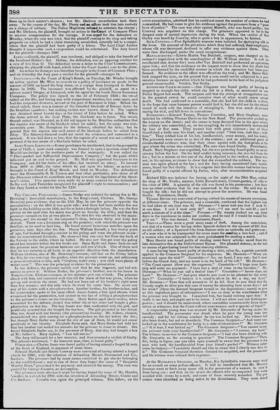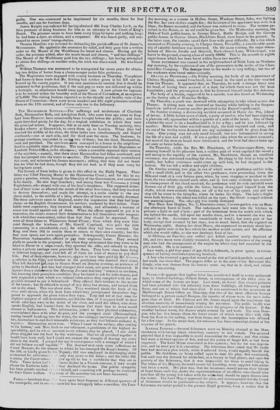At the MinntEsEx SESSIONS, on Monday, five Spitalfiehls weavers were
tried for an assault on some police-officers. It will be recollected that Mr. Moore's foreman went to fetch away some silk in the possession of a weaver, to save it from being cut ; and that on his return the officers who accompanied him were assailed with stones by a mob, and some of them severely wounded. The pri- soners were identified as being active in the disturbauce. They were found guilty. One was sentenced to be imprisoned for six months, three for four
months, and one for fourteen days. . . James Knight was indicted for having obtained 40/. from Charles Lock, on the false pretence of doing business for him as an attorney in the Court of King's Bench. The prisoner seems to have been every thing by turns and nothing long: he had been a dyer, an oilman, and a carpenter. He was found guilty, and sen- tenced to seven years' transportation. Thomas Hawkins was indicted for defrauding the parish-officers of St. James's, Westminster. He applied to the overseers for relief, and they gave him a written order on the Master of the Workhouse for bread and cheese. Having got the order, the prisoner added, after the words bread and cheese, "and two shillings." The Master of the Workhouse paid him the two shillings ; but having attempted to obtain five shillings on another order, the trick was discovered. He was found guilty. William Thomson was sentenced to be transported for seven years for obtain- ing two firkins of butter from a cheesemonger under false pretences. The Magistrates were engaged with county business on Thursday. Complaints had formerly been made that Mr. Stirling had neither given in his bill nor de- livered up the county papers. It was now unanimously carried, that it should be intimated to that gentleman, that if the said papers were not delivered up within a fortnight, an attachment would issue against aim. A new prison for vagrants is to be erected within the boundry wall of the House of Correction at an expense of 8,400/. The visiting Justices reported as to the cleanly and healthy state of the House of Correction : there were seven hundred and fifty eight prisoners confined there on the 12th current, and of these only ten in the Infirmary.
Tne HANOVERIAN Sisrens.—The • sufferings and misfortunes of Charlotte Both, Hermandine Both, and Adolphine Both, who some time ago came to Eng- land from Hanover. have occasionally been brought before the public ; and have
again furnished gossip for the day, by a tragical exhibition in which they were the principal actors. It appears, that at an early hour on Tuesday morning, they hired.a wherry at Greenwich, to carry them up to London. When . they had reached the middle of the river, the three ladies rose simultaneously and leaped overboard,—one at each side, and the third over the stern. The boatman, by prompt exertions, succeeded in sal* two of them ; but the third, Hermandine, sunk and perished. The survivors were conveyed to a house in the neighbour- hood in a pitiable state of distress. The case was mentioned to the Magistrates at Lambeth Police-Office, in the afteraoon ; when a constable reported their version
of the accident,—namely, that their sister Hermandine had fallen overboard, and they had jumped into the water to save her. The boatman positively contradicted this story, and reiterated his former statement; adding, that they did not thank him for what he had done, though they did not look as if they were sorry for having been saved.
The history of these ladies is given to this effect in the Daily Papers. Their father was Chief Fencing Master to the Hanoverian Court ; and for this he en-
joyed a pension, which, through the liberality of the Government, was continued to his family. He also kept boarders ; and among them was C--, a young Englishman, who eloped with one of his host's daughters. The supposed seduc- tion of their sister so affected the minds of the other five sisters, that they resolved to destroy themselves; and made the attempt, in a mode similar to the one above stated, in the middle of a lake, where two of them were actually drowned. The three survivors came to England, under the impression that they had latge claims on the English Government, for services rendered by their father. Their habits were expensive; they incurred many debts, and ultimately a warrant of arrest was issued against one of them.. When the officer appeared to put it in execution, the sisters avowed their determination to kill themselves with weapons with which they were armed, rather than that they should be separated. They were all three taken to Whitecross Street Prison ; from which they were libe- rated through the kindness of Mr. Sheriff Copeland, who pail the debt (amounting to a considerable sum) for which they had been arrested. The Meg sent them 50/. to enable them to return to their own country; but this they soon spent, and were again pennyless. Subsequently, Count Munster, the Hanoverian Ambassador, offered to pot their expenses. home. They seemed gladly to accede to the proposal; but when they understood that they were to be taken to Dover in a stage-coach, they spurned the offer, and refused to move, unless a private carriage were provided for them. They have since been living in different lodgings, and have left all of them for want of money to pay their bills. Part of their ekpenses, however, appear to have been paid by Mr. C , a solicitor in the City, and brother to the gentleman who married their sister. They left theirlast lodgings in Sloane Street on Monday evening, on pretence of going to Dartford ; put they had changed their mind, and gone to Greenwich. It appears from a statement iv the Morning Journal, that they "entered an inn there, but, knowing their pennyless condition, they hesitated to aak for refreshment, and only requested a bed, which was refused them unless they complied with the im- possible demand to pay it beforehand. They offered their trinkets to the master of the house; but he refused to accept of any thing but money, and turned them out to the street. This was about nine. They wandered about the bank of the river until eleven, when the boat from which they precipitated themselves hap- pened to approach the place where they were. They had not at that time the slightest purpose of self-destruction, nor did the idea of it suggest itself to their minds until they were in the midst of the river, and until the eldest, who alone speaks English, had learned from the boatman that their fare to town would amount to half-a-crown. This information, joined to their physical exhaustion, overwhelmed them with utter despair, and the youngest sister (Hermandine), casting herself headlong into the water, the two unhappy survivors plunged after her, determined to end their miserable existence, as they had hitherto endured it, together. Hermandine never rose. When I came to the surface, after sinking to the bottom,' said Miss Both to our informant, a gentleman of the highest re- spectebility, and on whose account every reliance may be placed, ' I saw Adol- phine dragged into the boat by the waterman. Had we all perished together it would have been well, but I could not endure the thought of leaving my sister alone in the world. I grasped the oar in consequence with a strength of i'vhich I did not believe myself capable.' " The Journal next casts some reflections on Count Munster, for the manner in which he has managed the King's bounty. Of the 501. so kindly given by his Majesty, 18/. was empluyed in discharging debts contracted for subsistence .;!. only was given to the ladies ; and the other 30/. n seems the Count refuses te give up till he has a certificate that they are in
Paris. These ladies had le eltered shelter in a French convent, if they would abjure the Lutheran faith ; t they declined the terms. The public sympathy has been greatly excited id a.eir behalf, and something will perhaps be contrived for their future welfare. Tee body of Hermandine has not been recovered.



















 Previous page
Previous page